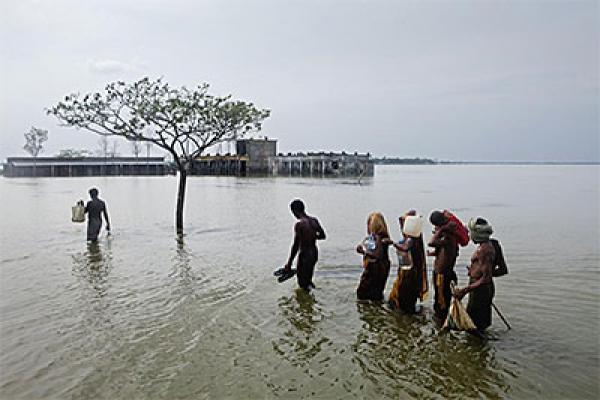“Humanity is intimately tied to the world we live in, and every societal action and technological advance has an effect on the earth,” reads one of the plaques in the current Unintended Journeys exhibit at the Natural History Museum in Washington, D.C.
The temporary exhibit, which runs until Aug. 13, is a powerful photographic portrait of the catastrophic effects environmental disasters are having on millions of people around the world.
The exhibit focuses on five different countries that have recently experienced or continue to experience severe weather conditions that have caused displacement, migration, intense hardship, and death for inhabitants. The disasters covered are the Hurricane in the Gulf, the Earthquake in Haiti, the Tsunami in Japan, Flooding in Bangladesh, and Desertification in East Africa.
It’s hard to say which element makes the exhibit most poignant. There’s the juxtaposition of pictures of people who are fighting to remain alive with museum visitors who say things like, “Oh, this one [exhibit] is artsy; I don’t do art.” There are also brief facts written in elegant script that accompany the photographs and tell the reader that nearly 500,000 refugees live in the semi-permanent Dadaab camps in Kenya and that, “Around the globe, an estimated 50 million people may be displaced within the next ten years as a result of desertification.” And, lastly, there’s the pictures themselves that show human resilience, intense pain, and an odd sense of globalization — one of them depicting a young Haitian girl clutching a blonde Barbie doll as she stands near her father after the earthquake.
There are two other things I really appreciate about the exhibit. The first is that the exhibit critically examines the role that international and governmental aid can have on disaster relief by including passages next to the photographs like, “Problems result when national and international aid is not carefully coordinated with local needs. When the deployment of aid is not monitored or the aid ceases before the objectives are met, the disaster situation may be worsened.”
Secondly, the exhibit included a small section titled, “Shared Unintended Journeys,” which used newspapers, children’s drawings, and magazine articles to tell specific stories of those who have been displaced. There is also a form on the Smithsonian Natural History Museum website in which people may submit personal stories or photographs of their own displacement due to natural disaster.
The exhibition is not large — in fact it is probably one of the smallest rooms in the Natural History Museum right now — but it is extremely well put together and is well worth the visitor’s time. Humanity cannot afford to ignore the effects climate change is having on our world. As Christians, we are called to care for both our planet and our global family. As Unintended Journeys so clearly demonstrates, this is in an area in which we are significantly failing.
Perhaps the most disturbing thing about Unintended Journeys is realizing that human displacement and death due to climate change is not an inevitable circumstance. Humanity has the power to slow and eventually reverse climate change. We only need to choose to do so.
Kara Lofton is editorial/online assistant at Sojourners.
Got something to say about what you're reading? We value your feedback!
